
There comes a moment of truth in most makeover scenarios, and it can go one of two ways:
- “Yes! This is who I was always meant to be!”
- “Nope. Nope, nope, nope, nope. What have I done to myself?”
The first option accompanies the Cinderella-type makeovers that occur near the end of the story, when the curtain drop is imminent and everything is twisting happily together. The second option, on the other hand, occurs when the makeover character has time to reflect on the many changes that their new look has prompted, and to assess whether those changes are pleasant or otherwise.
I’m sort of a sucker for the second type. Much as I adore the whole before/after effects that a makeover brings into the plot, I love when a character realizes their inherent worth had nothing to do with their looks and that the grass isn’t always greener on the other side of the fence. Every set of circumstances brings its share of challenges, so when a post-makeover plot is all sparkles and sunshine, it feels unbalanced to me.
Narrative Moment of Truth
Change is difficult, and whether a character can embrace it wholeheartedly or needs to step back a pace depends on their personality. The Makeover trope, as simple as it is, allows for variable results. It can also reveal when an author’s character development is lacking.
Some questions to ask when this plot device crops up:
- Why is this character getting a makeover?
- What advantages will come from the makeover? What disadvantages?
- Does the makeover bring out the best in the character? Does it bring out a nasty streak?
- Post-makeover, does this character act true to their established personality?
A higher social status—especially one achieved with relative ease—can bring out the worst in someone. Those who have been mistreated in the past often mimic that treatment upon others when they get into a position of greater influence. It’s human nature. Society is a fickle beast, and any easy ascent in popularity might just as easily vanish.
The strong characters, then, are those who can recognize themselves beyond any pleasing or trendy façade, who treat others with dignity regardless of their position on Fortune’s ever-turning wheel, who learn from their mistakes and ultimately stay true to their fundamental beliefs.
The Makeover itself might only be skin deep, but it lays bare the inward character—whether darling or demon.